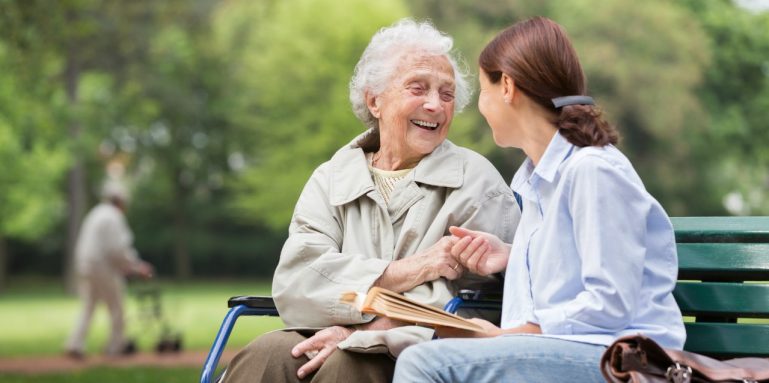
Alzheimer’s: symptoms, progression and treatment
What goes on in the brain when someone has Alzheimer’s? Is Alzheimer’s curable and what is the difference between Alzheimer’s and dementia? Find out more about Alzheimer’s, typical symptoms and how you can prevent Alzheimer’s.
Overview of topics
What is Alzheimer’s?
Alzheimer’s (Morbus Alzheimer) is the most common form of dementia. It is named after Alois Alzheimer, the psychiatrist who first described the disease. Around 60% of people with dementia suffer from Alzheimer’s dementia. In Alzheimer’s, the brain cells gradually lose their function before ultimately dying, which results in a gradual decrease in mental capacities. Most people affected by Alzheimer’s are over 65 years old.
Types of Alzheimer’s
There are two types of Alzheimer’s: presenile Alzheimer’s dementia and senile Alzheimer’s dementia. In presenile Alzheimer’s dementia, the first symptoms appear before the age of 65. In senile Alzheimer’s dementia, however, these do not appear until after the age of 65.
What is the difference between Alzheimer’s and dementia? “Dementia” is an umbrella term for several different conditions. Alzheimer’s disease is a form of dementia. In addition to Alzheimer’s dementia, there’s Parkinson’s dementia, vascular dementia and frontotemporal dementia.
Alzheimer’s: causes and risk factors
In Alzheimer’s, proteins accumulate in the brain of the affected individual: the beta-amyloid protein accumulates in certain blood vessels and between the nerve cells, and the tau protein accumulates in the brain’s nerve cells. This causes the nerve cells in the brain to gradually die. Why this happens is still unclear. But what predisposes someone to Alzheimer’s? Research has identified various risk factors:
- Increased age
- Calcified vessels
- Increased cholesterol levels
- High blood pressure
- Genetic predisposition
So, is Alzheimer’s hereditary? According to researchers, Alzheimer’s may under certain circumstances be hereditary. That said, only 1% of Alzheimer’s conditions are determined by genetics. In these cases, the symptoms occur early on between the ages of 30 and 60. These are caused by certain genetic defects. In all other cases of Alzheimer’s, age is the biggest risk factor. Certain genes play a role in predisposition here too. These genes are a key theme in current research.
Symptoms of Alzheimer’s
Alzheimer’s causes various symptoms. Typical signs of Alzheimer’s include:
- Memory problems and forgetfulness: those affected increasingly forget important appointments and lose things
- Disorientation: they have difficulty orienting themselves in time and space. For instance, they don’t know the date or don’t know where their home is
- Perception disorders: people with Alzheimer’s can often no longer recognise pictures or familiar faces. They have major difficulty in grasping spatial dimensions
- Language and literacy problems: Alzheimer’s patients have increasing difficulty understanding written and spoken words. They have difficulty following conversations and finding the right words (aphasia)
- Withdrawal: those affected perceive changes in themselves and feel unsettled. They withdraw from their social environment
- Personality changes: Alzheimer’s can cause aggression and mood fluctuations. In many cases, people with Alzheimer’s are also sad and feel helpless
- Loss of appetite and eating disorders: patients no longer properly perceive hunger and thirst.
Alzheimer’s: how does it progress?
Experts break the progression of Alzheimer’s dementia down into four stages.
Alzheimer’s stage 1 – MCI (Mild Cognitive Impairment)
At this stage, those affected experience slight cognitive impairment, with minimal impact on their day-to-day life. Alzheimer’s symptoms at this stage include:
- Decreased performance
- Slight disorientation
- Slight memory problems
Alzheimer’s stage 2 – early stage
In the early stage, the memory starts to deteriorate. This is a key symptom of this stage and initially affects short-term memory. This stores information that people need for a short time. Those affected often misplace items and find it difficult to follow conversations. They have problems with everyday tasks and sometimes depend on help for these. As a result, they experience mood fluctuations because they notice these changes and start to feel uncertain.
Alzheimer’s stage 3 – middle stage
Impairments have now started to affect long-term memory too. This stores information for longer periods – e.g. childhood memories or memories of relatives. In the middle stage, patients can no longer manage at home and their spatial vision is impaired. They are often irritable, aggressive, depressed or nervous. Their perception of time is distorted, which often causes sleeping problems. They can no longer live independently. Those affected require comprehensive support.
Alzheimer's stage 4 – late stage
In the late stage, patients need round-the-clock care. Bodily functions like chewing and swallowing are heavily impaired. The bladder and the bowel no longer function properly either.
Alzheimer’s is not fatal in and of itself. Those affected generally die from an infectious illness because their immune system is heavily impaired. Pneumonia is a frequent cause of death among people with Alzheimer’s.
How long do people with Alzheimer’s live? In Alzheimer’s, the average life expectancy after diagnosis is six years.
How is Alzheimer’s diagnosed?
There are various tests and examinations used by experts to diagnose Alzheimer’s:
- Medical history: the doctor asks questions relating to medical history and any medication being taken by the patient. This helps them to rule out any other illnesses
- The Clock Drawing Test: the examining specialist asks the patient to draw a specific time on a clock face. This enables them to test visual memory
- Mini Mental Status Test (MMST): the doctor uses this test to check orientation and memory. They ask questions about the time and place and give the patient calculation or writing tasks
- Dementia Detection Test (DemTect): the DemTect includes several tasks and tests episodic memory, amongst other things. This includes memories of personal experiences. The DemTect also tests perception, working memory and intellectual capacity
- Magnetic resonance imaging (MRI) and computer tomography (CAT): these imaging methods are used by medical specialists to examine brain matter. A reduction in this is indicative of dementia. Experts also use these procedures to rule out other diseases, i.e. a brain tumour
- Laboratory tests: the doctor can also use a urine or blood test to rule out other illnesses. A CSF examination (lumbar puncture) provides specialists with additional certainty.
An initial Alzheimer’s test is generally performed by a GP. They usually perform the clock drawing test or MMST as well as a blood and urine test. Where dementia is suspected, they will refer the patient to a neurological specialist. They can reliably diagnose whether or not Alzheimer's disease is indeed present.
What does treating Alzheimer’s involve?
Alzheimer’s is not curable. Alzheimer’s therapy treats the symptoms of the disease. It consists of both medicinal and non-medicinal treatment approaches.
Alzheimer’s medication
The doctor may prescribe one of the following medications for Alzheimer’s:
- Anti-dementia agents: these counter cognitive decline and support the ability to learn and the memory. The aim is to slow the decline in brain function
- Neuroleptics: medical specialists sometimes prescribe neuroleptics for challenging behaviour
- Antidepressants: some dementia patients develop depression. Under these circumstances, doctors may prescribe antidepressants, among other things.
Non-medicinal Alzheimer’s treatment
The non-medicinal treatment of Alzheimer’s includes mental exercises such as word plays for example. Large clocks, calendars and simple signs/labelling can help those affected with spatial and temporal orientation. This can help them to retain their independence for as long as possible.
Physiotherapy can help Alzheimer’s patients to improve their coordination and satisfy their urge to move. Occupational therapy can also help with Alzheimer’s: those affected gain independence and learn how to manage day-to-day and use aids.
In addition to this, many patients receive behaviour therapy if they are affected by mood swings, depression or other psychological impairments. This form of treatment is useful, particularly in the early stages of Alzheimer’s dementia.
Relatives play an important role if a closely related person becomes ill with Alzheimer’s. Are you a relative of someone with Alzheimer’s? Keep the following advice in mind:
- Find out as much as you can about Alzheimer’s
- Try to put yourself in the position of the affected person and be supportive and understanding. Accompany the affected person to doctor's appointments
- Be patient. People with Alzheimer’s often act illogically. Try to remain relaxed. Talk slowly and in short sentences
- Initially, many relatives opt for in-home care. Talking to a specialist will help you determine whether and when nursing care is advisable for Alzheimer’s. For this, refer to the attending physician or a specialist consultant
- Don’t forget yourself. Dealing with relatives with Alzheimer’s can be very stressful. Take a break and accept any offers of help. You can get information about this from Alzheimer’s Switzerland. To find out more, you can look at our brochure on dementia.
How do you prevent Alzheimer’s?
The risk of Alzheimer’s dementia increases with age. But a healthy lifestyle can help to keep your brain healthy and to prevent the disease:
- Make sure you have a balanced diet and include brainfood like nuts and wholegrain products in your diet.
- Lower your risk of Alzheimer’s and avoid alcohol. Ideally, avoid smoking.
- Challenge your brain: read books, do puzzles or learn how to play an instrument. This will keep you mentally fit.
- Ensure you get regular exercise. Walk more often or take up a new sport.
- Get regular medical checkups. That includes blood pressure and cholesterol tests. You should also pay attention to your weight.
- Avoid stress. Integrate relaxation methods in your daily routine.
Alzheimer’s is a challenging disease – both for those affected and their relatives. Talk to your doctor if you think you may be affected by Alzheimer’s dementia. And if you’re a relative, you’re not alone. Find out more about support and respite services.

The specialist provided the editorial team with advice and input for this article. Cécile Rohrer Kaiser (Master of Public Health, University of Zurich) works for the Helsana health consultation service. She helps customers with issues to do with prevention and health promotion.


Newsletter
Find out more about current health issues every month and get all the information you need about our attractive offers from all Helsana Group companies * delivered by e-mail to read whenever it suits you. Our newsletter is free of charge and you can sign up here:
We did not receive your information. Please try again later.
* The Helsana Group comprises Helsana Insurance Company Ltd, Helsana Supplementary Insurances Ltd and Helsana Accidents Ltd.